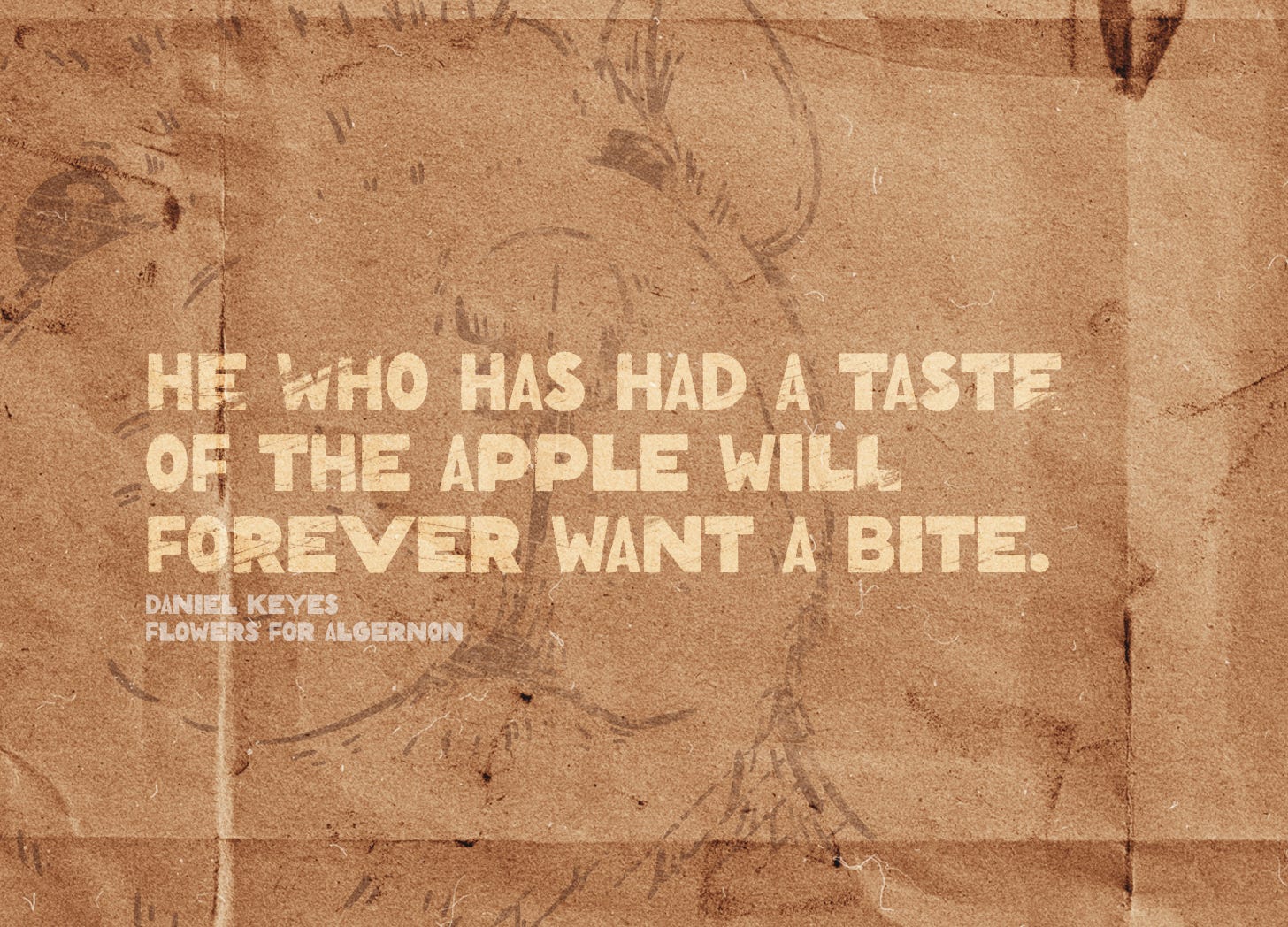Flowers for Algernon by Daniel Keyes
When was the last time you remember a book triggering a flood of emotions? I have read my share of books and Daniel Keyes story about Charlie nearly broke me.
It has been quite a while since I read a book that triggered real emotion in me. When I was reading The Road by Cormac McCarthy, I felt immersed in the world he created, caught up in the sadness, despair, and unending grey environment the characters attempted to navigate. Similar in ways to an addict chasing a high, I long for books that elicit an emotional response when reading them.
Enter Flowers for Algernon.
Told from the perspective of Charlie Gordon, who is labeled as “mentally disabled”. Given when this book was originally published, the language and terminology surrounding disability were quite different. Using a phrase such as mentally disabled man in 1959 would not raise any eyebrows. Today, there would be different language used. Or, so I hope. My full-time job and volunteer work involves serving the disability community. I am now more aware and sensitive to terms that were once OK but now frowned upon. I tip-toed my way into this book, as the story, from Charlie’s perspective, began to unfold.
In today’s world, Charlie would most likely be said to have an intellectual disability. With an IQ of 68, Charlie could also have been labeled with “mental retardation”.
“The vast majority of people in the United States have I.Q.s between 80 and 120, with an I.Q. of 100 considered average. To be diagnosed as having mental retardation, a person must have an I.Q. below 70-75, i.e. significantly below average. If a person scores below 70 on a properly administered and scored I.Q. test, he or she is in the bottom 2 percent of the American population and meets the first condition necessary to be defined as having mental retardation.” [Source]
Author Daniel Keyes was said to have drawn inspiration for Charlie through his years of teaching experience. Keyes stated that one young man, who was “mentally challenged”, served as the catalyst for the book, specifically his curiosity surrounding what would happen if it was possible for the person to gain intelligence.
There is a unique power granted to the story simply based on it being told from Charlie’s point of view. Readers are given insight into his life, and how he is isolated and teased, by way of journal entries, that are part of the experiment Charlie agreed to participate in. This experiment is said to make Charlie smarter, something he is aware of and seeks out.
This experiment was successfully performed on Algernon, a mouse, where the doctors saw an increase in intelligence. With Charlie on board, the scientists “surgically enhance” his brain with the goal of improving his intellectual capacity. The experiment proves to be initially successful and Charlie progresses to the point where he would be considered a genius. This entire process is carefully recorded through journal entries by Charlie and it becomes apparent to the reader when the changes to his intellect happen.
I found a reviewer who cleverly stated:
“as Algernon and Charlie's destinies intertwine, it becomes evident that intelligence alone does not guarantee emotional well-being or fulfillment, and that compassion and human connection remain fundamental to leading a satisfying life.”
Keyes tackles some tough issues with this story, such as, is an experiment to improve intellect even ethical in the first place? How does society view Charlie with his new-found intelligence versus when he did not? How did Charlie see the world around him? What happens to his life when he finally gains the knowledge he pursues? Is that enough to finally grant him happiness?
When I finished the book, I remember feeling a flood of emotions, unlike any book I have finished recently. I don’t feel it is enough to say this is a powerful read and leave it at that, but I also do not want to delve too far into why I felt emotional reading this.
Working with and serving those affected by disability, I might have been a little extra sensitive going in. This story, however, stood out in how it exposed those with disabilities and how they are treated by society. At the beginning of the story, Charlie is teased and ridiculed because of his intellectual disability. Despite gaining intelligence, he continues to face ridicule and isolation, just for different reasons. Keyes does well at bringing to the forefront every person’s need to be accepted. It also brings to light what happens when people achieve what they think will make them happy, only to find out that it doesn’t.
I believe that this story would be powerful on its own, yet, being told from Charlie’s perspective, it becomes a lightning rod for emotion.
Flowers for Algernon on Goodreads
You’ll Also Enjoy
I have found it difficult to compare Flowers for Algernon to any other book, even those frequently grouped in similar genres. However, if you enjoyed Flowers for Algernon, then I would recommend reading The Road by Cormac McCarthy, Room by Emma Donoghue, and Tender is the Flesh by Agstina Bazterrica.






